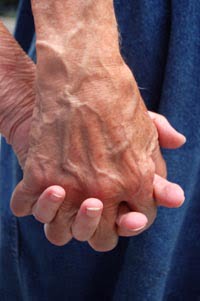Seniors, Straight and Gay Alike, Face Elder Care Issues
 By Moe White
By Moe White
On June 2, the Land of Sky Regional Council sponsored a forum on “Proactive Aging: Understanding Your Health and Long-term Care Choices” about care options available for seniors: Home Health care aides, private duty nursing, elder day care programs, hospice, and such types of facilities as Independent Living, Assisted Living, Skilled Nursing, and Continuing Care.
The program was co-sponsored by LGBT Elder Advocates of WNC. While nearly everyone deals with issues of elderly parents with limited resources and facing greater needs as they age, LGBT people often must ensure appropriate care when there is no “legal” family or spouse and facilities lack knowledge or training to help.
These seniors need institutions and service providers to be aware of their circumstances (like changing information forms to ask about partners or chosen family as well as “spouse” or “family member”), while facilities and service providers must ask themselves how they should address individuals who don’t fit the traditional family arrangement.
Amy Fowler, a certified Geriatric Care Manager in private practice, presented information on the options for those facing later life choices. She began with the common preference expressed by most seniors: “I want to live at home, so how do I get support?” Her checklist included:
- Plan ahead: What are the types of help you would want in the future?
- What is your current state of health—or illness?
- What support do you have—family or family of choice—to help you out?
- Become savvy—You don’t have to learn it all, but know enough to know what to ask!
Levels of care
Fowler explained how Home Health Care is provided by Medicare but is temporary, following surgery or an illness, while Private Duty Nursing is paid for by the patient or family, or by insurance coverage such as Long Term Care insurance.
What some elders need is Adult Day Care, offering socialization (especially for those who are alone much of the time); respite for caregivers; and even all-day care, allowing caregivers to hold down a regular job. Some of these providers can also administer medication, or help with personal care.
Seniors with an incurable condition might need Palliative Care; those whose prognosis is six months or less to live are eligible for Hospice care (those in Hospice who live longer can return home and, if needed, then return to Hospice later).
Types of facilities
Independent Living offers healthy seniors cottages or apartments, some meals, activities, and services like shopping or dining out. Assisted Living facilities—which are not regulated by Medicare—range from simple to elaborate. Some offer just a room, others private apartments; they might provide all meals, occupational or physical therapy, laundry service, etc. It’s essential to learn in advance how a particular facility is structured.
Nursing Homes offering skilled nursing are regulated by Medicare and can be investigated at the Medicare.gov website. They provide a higher level of care for residents who can no longer live at home or are bed-bound, or those with dementia or other physical, emotional, or mental limitations.
Patients referred from hospitals can be covered by Medicare (100% for the first 20 days, 80% thereafter), if the patient was admitted to the hospital for a minimum of three nights. (Federal rules now limit or reject payment to hospitals if a patient is readmitted within 30 days of previous treatment for the same condition; some hospitals keep patients “under observation” rather than “admission,” making them ineligible for skilled nursing to be paid for by Medicare.)
Continuing Care Retirement Communities such as Deerfield and Givens Estates offer the continuum from Independent to Assisted to Skilled nursing.
Other resources
Ninety percent of all seniors say they want to continue living at home, and there are numerous other resources that help them do so. Among them:
- Meals on Wheels, delivered daily and at community meal sites
- Money management to help seniors forgetful about banking, bill-paying, etc. and to protect them from con artists who prey on the elderly.
- Technology such as iPads that allow people to do household tasks, remind them to take pills, or alert a caregiver about unexpected changes in condition. The VA system offers many electronic devices to help with home care—and pays for them!
- Councils on Aging in Buncombe and surrounding counties, the 211 system (like 411 for emergencies), and various Senior Advocacy groups, are all excellent sources of information, advocacy, or services
- Community health organizations such as WNCCHS and ABIPA
- Geriatric care managers who are certified, licensed professionals
Services offered by geriatric care managers encompass:
Professional Support
- Assesses needs
- Develops a plan
- Links to services
- Mediates family conflicts
- Crisis intervention
Monitoring
- Ensures needs are met
- Identifies changes & makes
adjustments - Keeps family informed
- Peace of mind
- Ongoing evaluation & adjustment
of plan
Care coordination
- Communication hub
- Advocacy
- Ensure quality & effective care
For more information about licensed and registered geriatric care managers, visit www.Care Management.org. Amy Fowler is a certified care manager at WNC Geriatric Care Management; she can be reached at [email protected] or (828) 776-4269.






